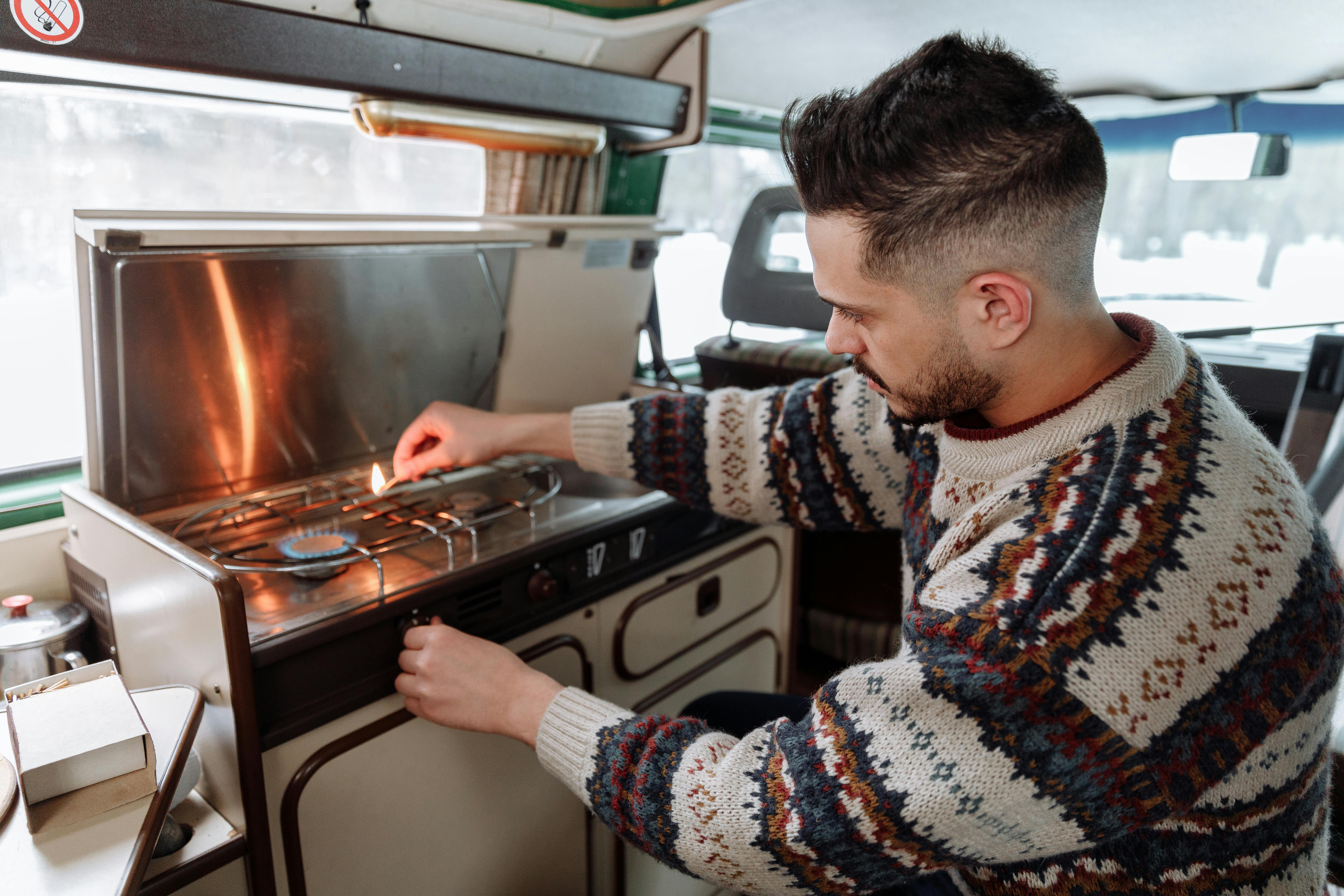How to Stay Safe While Living in a Van
Table of Contents
Are you excited to embark on a journey of freedom and adventure with van life? While the allure of waking up to new vistas and living on your own terms is undeniable, safety should always be your top priority. Whether you’re a seasoned van lifer or just starting out, knowing how to stay safe on the road is crucial. From choosing the right parking spots to securing your belongings, here’s a comprehensive guide on how to stay safe while living in a van.
1. Choose Safe Parking Spots
Do Your Research
Before settling for a night, research your parking spot thoroughly. Use apps and websites that cater to van lifers to find safe and recommended spots. Avoid areas known for high crime rates and always prioritize well-lit and populated places.
Look for Signs
Pay attention to signs indicating whether overnight parking is allowed. Respect local laws to avoid fines or being asked to move in the middle of the night.

2. Maintain a Low Profile
Keep a Low-Key Appearance
Avoid drawing unnecessary attention to your van. This means keeping a tidy exterior, not displaying valuable items, and refraining from using flashy decorations that might indicate a tourist or traveler.
Blend In
Try to blend in with your surroundings. If you’re in a residential area, park in a way that makes your van look like it belongs there. In urban areas, avoid staying in one spot for too long to prevent suspicion.
3. Secure Your Van
Invest in Good Locks
Ensure all doors and windows have secure locks. Consider adding additional security measures such as deadbolts or padlocks for extra protection.
Use a Security System
Installing a security system can deter potential thieves. Look for systems with alarms, cameras, and motion sensors to keep your van safe.
4. Be Aware of Your Surroundings
Stay Vigilant
Always be aware of your surroundings. Take note of people loitering or acting suspiciously near your van. Trust your instincts and leave if you feel uncomfortable.
Plan Your Arrivals
Try to arrive at your parking spot during daylight hours. This gives you a chance to assess the area and make a safer choice.
5. Have a Safety Plan
Emergency Contacts
Keep a list of emergency contacts easily accessible. This should include local law enforcement, friends or family, and roadside assistance services.
Know Your Exits
Familiarize yourself with all the exits in your van. In case of an emergency, knowing the quickest way out can be crucial.

6. Practice Good Hygiene and Health Safety
Sanitize Regularly
Living in close quarters means germs can spread quickly. Regularly clean and sanitize your living space, especially high-touch areas.
Stay Hydrated and Eat Well
Proper nutrition and hydration are vital for staying healthy on the road. Keep a supply of clean water and nutritious food in your van.
7. Keep Your Vehicle in Top Condition
Regular Maintenance
Regularly check your van for any maintenance issues. This includes oil changes, tire pressure, and checking the brakes. A well-maintained van is less likely to break down in unsafe areas.
Emergency Kit
Always have an emergency kit in your van. This should include a first aid kit, tools, spare tire, jumper cables, and other essentials.
8. Have a Backup Plan
Alternative Parking Spots
Always have a backup parking spot in mind in case your first choice doesn’t work out. This ensures you’re not scrambling for a safe place at the last minute.
Emergency Funds
Keep a stash of emergency cash in your van. This can be crucial if you lose your wallet or need to pay for unexpected expenses.
9. Connect with the Van Life Community
Share Your Location
Stay in touch with other van lifers. Sharing your location with trusted friends or family members can add an extra layer of safety.
Use Social Media Wisely
While it’s great to share your adventures on social media, be cautious about revealing your exact location in real time. Save the detailed posts for after you’ve moved on to a new spot.

10. Protect Your Privacy
Use Window Covers
Invest in good quality window covers to maintain privacy inside your van. These can also help regulate temperature and keep your van cool.
Be Discreet
Avoid sharing too much information about your travel plans with strangers. Be friendly but cautious about who you trust with personal details.
11. Stay Legal
Understand Local Laws
Research and understand the laws regarding van living and overnight parking in the areas you visit. Staying legal helps you avoid fines and run-ins with law enforcement.
Have Proper Documentation
Ensure all your vehicle documentation, including registration and insurance, is up to date and readily accessible.
12. Be Prepared for Weather Changes
Monitor Weather Reports
Keep an eye on the weather forecast to avoid getting caught in dangerous conditions. Having weather apps on your phone can provide timely updates.
Have a Weather Plan
Know what to do in case of severe weather. This includes having a plan for extreme heat, cold, rain, or storms.
13. Carry Self-Defense Tools
Non-Lethal Options
Consider carrying non-lethal self-defense tools like pepper spray or a personal alarm. These can provide an added sense of security.
Learn Self-Defense
Taking a self-defense class can equip you with the skills and confidence to protect yourself if necessary.
14. Manage Personal Safety
Stay Connected
Regularly check in with friends or family to let them know you’re safe. This can be as simple as sending a quick text or sharing your location through a tracking app.
Avoid Risky Areas
Stay away from areas known for high crime rates or dangerous conditions. It’s better to take a longer route if it means staying safe.
15. Keep a Low Profile at Night
Avoid Unnecessary Travel
Try to minimize driving at night. It’s harder to spot potential hazards, and you’re more vulnerable to accidents or crime.
Use Discreet Lighting
Use low-key lighting inside your van at night to avoid drawing attention. Blackout curtains can help keep your interior private.

16. Build Local Knowledge
Talk to Locals
Engaging with locals can provide valuable insights into safe and unsafe areas. They can offer tips on good parking spots and local amenities.
Learn the Lay of the Land
Spend time familiarizing yourself with the layout of new areas. Knowing where the nearest gas station, grocery store, and emergency services are located can be very helpful.
17. Keep Emergency Numbers Handy
Local Emergency Services
Keep a list of local emergency numbers in an easily accessible place. This should include police, fire, and medical services.
Roadside Assistance
Having a membership with a reliable roadside assistance service can be a lifesaver if you experience vehicle trouble.
18. Stay Physically Fit
Regular Exercise
Staying fit can improve your overall health and readiness to handle physically demanding situations. Simple exercises like stretching, running, or hiking can be incorporated into your daily routine.
Self-Care
Take care of your mental health as well. Practicing mindfulness, meditation, or other relaxation techniques can help you stay calm and focused.
19. Plan for Connectivity
Reliable Communication
Ensure you have reliable means of communication, especially in remote areas. A fully charged phone, portable charger, and possibly a satellite phone can keep you connected in case of emergencies.
Internet Access
For those working remotely, a reliable internet connection is essential. Invest in a good mobile hotspot or consider options like Starlink for more remote connectivity.
20. Trust Your Instincts
Listen to Your Gut
Your intuition is a powerful tool. If something feels off, trust your instincts and move to a safer location.
Stay Calm
In any potentially dangerous situation, staying calm and composed can help you think clearly and make better decisions.
Frequently Asked Questions about Van Living
How do I be safe in my van?
Staying safe in your van involves several key practices. First, choose well-lit, populated parking spots and research areas ahead of time using trusted apps. Keep your van secure with quality locks and a reliable security system. Install roof vents and fans for proper ventilation and use blackout curtains for privacy. Regularly maintain your vehicle to prevent breakdowns, and carry a first aid kit and emergency supplies. For personal safety, stay aware of your surroundings and trust your instincts—if something feels off, move to a safer location. Additionally, having reliable communication devices and sharing your location with friends or family can enhance your security. Lastly, follow local laws regarding overnight parking to avoid fines or disturbances. By taking these precautions, you can enjoy the freedom of van life with peace of mind.
How do you stay safe sleeping in a van?
Staying safe while sleeping in a van involves several key steps. First, choose well-lit, populated areas and avoid isolated spots. Research and use apps to find safe, legal overnight parking. Secure your van with quality locks and consider a security system with alarms and cameras. Ensure your windows have blackout curtains to maintain privacy and deter prying eyes. Regularly maintain your vehicle to prevent breakdowns, and have an emergency kit with first aid supplies handy. Keep a charged phone and share your location with trusted friends or family. Avoid parking in the same spot frequently to prevent attracting unwanted attention. Trust your instincts—if something feels off, move to a safer location. Lastly, adhere to local laws regarding overnight parking to avoid fines or disturbances. By following these tips, you can enjoy a peaceful and safe night’s sleep in your van.
How do I prepare to live in a van?
Preparing to live in a van involves several essential steps. First, downsize your belongings to fit the limited space, prioritizing multi-functional items. Customize your van with secure storage solutions, a comfortable sleeping area, and proper ventilation. Invest in a reliable power source, like solar panels, for electricity needs. Install insulation and weatherproofing for temperature control. Plan for cooking and hygiene by incorporating a compact kitchen setup and portable toilet or membership to gyms for showers. Ensure your van is mechanically sound with regular maintenance checks. Create a budget and save for unexpected expenses. Research and plan your routes, identifying safe, legal overnight parking spots using apps and online resources. Prioritize safety with quality locks, a security system, and emergency supplies. Stay connected with a mobile hotspot or data plan.
How do I stop people from breaking into my van?
To stop people from breaking into your van, implement several security measures. Invest in high-quality locks for all doors and windows, and consider additional deadbolts or padlocks for extra protection. Install a reliable security system with alarms, cameras, and motion sensors. Keep your van’s appearance low-key by avoiding visible valuables and using blackout curtains to maintain privacy. Park in well-lit, populated areas and avoid leaving your van unattended for long periods. Use a steering wheel lock or a pedal lock to deter thieves from driving away with your van. Always lock your doors and windows, even when you’re inside. Install a GPS tracker to help recover your van if it’s stolen. Regularly change your parking spots to avoid becoming a target.
Is it OK to live in a van?
Yes, it is OK to live in a van, and many people find it a rewarding lifestyle. Living in a van offers freedom, flexibility, and the opportunity to travel and explore new places. To make van life sustainable, ensure your van is well-equipped with essentials like a comfortable sleeping area, kitchen setup, and proper ventilation. Prioritize safety with quality locks and a reliable security system. Adhere to local laws regarding overnight parking to avoid fines. Plan your budget carefully and save for unexpected expenses. Embrace minimalism by downsizing your belongings to fit the limited space. Stay connected with a mobile hotspot or data plan for communication and work purposes. Join van life communities for support, tips, and inspiration.
How do you ventilate a van for sleeping?
To ventilate a van for sleeping, start by installing roof vents or fans to facilitate air circulation. These can effectively expel hot air and bring in fresh air, maintaining a comfortable temperature. Consider using window vents or rain guards, which allow windows to be slightly open without compromising security or letting in rain. Portable fans can also help improve airflow inside the van. Use mesh screens on windows and doors to keep bugs out while allowing fresh air to flow through. For additional ventilation, position your van to take advantage of natural breezes, such as parking near water bodies or in shaded areas. Regularly clean and maintain your ventilation systems to ensure optimal performance. These steps will help create a comfortable sleeping environment in your van, enhancing your overall van life experience.
How do you stay warm living in a van?
To stay warm living in a van, start by insulating your van with high-quality materials to retain heat. Install thermal curtains or window covers to block drafts. Use a portable heater, such as a propane or electric heater, but ensure proper ventilation to prevent carbon monoxide buildup. Layer your bedding with warm blankets, sleeping bags, and thermal liners. Invest in a high-quality, cold-weather sleeping bag for extra warmth during chilly nights. Wear thermal clothing and keep cozy accessories like hats, gloves, and thick socks on hand. Seal any gaps or cracks in doors and windows to prevent cold air from entering. Consider using a hot water bottle or heating pad to pre-warm your bed. Stay active inside the van to generate body heat.
How to secure things in a van?
To secure things in a van, start by installing sturdy storage solutions like cabinets, drawers, and bins with locking mechanisms to keep items in place while driving. Use bungee cords, tie-down straps, and Velcro to secure loose items and prevent them from shifting. Add non-slip liners to shelves and drawers to keep things from sliding around. Install roof racks and cargo nets for additional storage and to keep bulky items secure. For valuable items, use a small, hidden safe or lockbox. Ensure all doors and windows have high-quality locks and consider adding deadbolts for extra security. Regularly organize and declutter your space to minimize the risk of items becoming loose. Use hooks and adhesive strips to hang lightweight items securely.
How do I protect the underside of my van?
To protect the underside of your van, start by installing a skid plate or underbody armor to shield critical components like the oil pan, fuel tank, and exhaust system from damage. Regularly inspect the undercarriage for signs of rust, and apply rust-proofing treatments or undercoating to prevent corrosion. Clean the underside frequently, especially after driving on muddy or salty roads, to remove debris and salt that can cause rust. Consider adding mud flaps to reduce the amount of dirt and debris that hits the undercarriage. Ensure that your suspension is in good condition to absorb shocks and protect the van’s underside on rough terrain. Avoid driving over large obstacles or through deep water, which can damage the undercarriage.
Safety First, Adventure Always!
Living in a van offers incredible freedom and adventure, but it also comes with unique challenges and responsibilities. By prioritizing safety and being prepared for various situations, you can enjoy the van life experience to its fullest. Remember, a little caution goes a long way in ensuring your journey is not only exciting but also safe. So, pack your bags, rev up the engine, and embark on your van life adventure with confidence and peace of mind. Safe travels!

